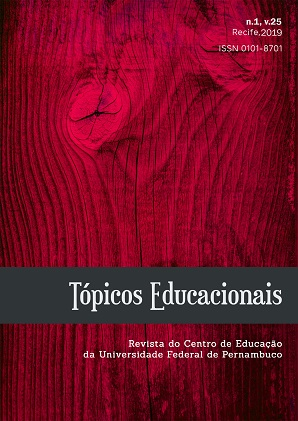Acquisition of writing: analysis of children's texts through Interactionism
DOI:
https://doi.org/10.51359/2448-0215.2019.243787Keywords:
Linguagem escrita, Interacionismo, Literatura infantil, Ensino-aprendizagemAbstract
Considering that the research on the acquisition of written language deserves special attention because it allows to observe the stages of this initiation and, consequently, the phenomena of this acquisition, this work has as objective to analyze the capture of the child by the language. In order to do so, we start from questions already discussed by authors affiliated to interactionism in language acquisition as to the effect of the other (similar) and the Other (treasure of signifiers) in the process of acquiring writing, as well as the impossible language that breaks into writing Child and cause estrangement. The results pointed out that the initial writing, because it is a fact of language, is not immune to misunderstandings and displacements of the language, since the child, at the beginning of the writing acquisition process, alienated to the texts of the other and submitted to the Tries to represent speech in writing
References
BORGES, Sônia Xavier de Almeida. A aquisição da escrita como processo linguístico. In: LIER-DEVITO, Maria Francisca; ARANTES, Lúcia (Org.). Aquisição, patologias e clínica da linguagem. São Paulo: EDUC, FAPESP, 2006. p. 149-159.
BORGES, Sônia Xavier de Almeida. Psicanálise, linguística, linguisteria. São Paulo: Escuta, 2010.
BORGES, Sônia Xavier de Almeida. Escrita e letra na psicanálise: algumas considerações. In: LIER-DE VITTO, Maria Francisca; ARANTES, Lúcia (Org.). Faces da escrita: linguagem, clínica, escola. Campinas, SP: Mercado de Letras, 2011. p. 75-82.
BOSCO, Zelma Regina. No jogo dos significantes, a infância da letra. Campinas, SP: Pontes, 2002.
BOSCO, Zelma Regina. A errância da letra: o nome próprio na escrita da criança. Campinas, SP: Pontes Editores, 2009.
HAUN, Gustavo Atallah. Um exemplo de texto oralizado. Disponível em http: http://oblogderedacao.blogspot.com/2013/02/que-fofo.html.%20Acesso%20em%2005/06/2017. Acesso em 05/06/2017.
LACAN, Jacques. O Seminário, livro 5. As formações do inconsciente. Rio de Janeiro: Zahar, 1999 [1957-1958].
LEMOS, Cláudia Thereza Guimarães de. Sobre a aquisição da escrita: algumas questões. In: ROJO, Roxane. Alfabetização e letramento: perspectivas linguísticas. Campinas, SP: Mercado das Letras, 1998. p. 8-18.
__________. Desenvolvimento da Linguagem e Processo de Subjetivação. Revista Interações, v. V, n. 10. Jul/dez., p. 53-72, 2000.
__________. Das Vicissitudes da Fala da Criança e sua Investigação. Cadernos de Estudos Linguísticos. Campinas: IEL/Unicamp, n. 42, p. 41-69, 2002.
__________. Uma crítica (radical) à noção de desenvolvimento na Aquisição da Linguagem. In: LIER-DE VITTO, Maria Francisca; ARANTES, Lúcia (Org.). Aquisição, patologias e clínica de linguagem. São Paulo: EDUC, FAPESP, 2006. p. 21-32.
LUIZE, Andréa. Ele escreve faltando letras: corrijo ou não? Disponível em http://www.escoladavila.com.br/blog/?cat=4&paged=23. Acesso em: 05/06/2017.
MILNER. Jean-Claude. O amor da língua. Campinas, SP: Editora da Unicamp, 2012.
PASSOS, Luciana Maria Marinho. Alegria de Saber: Livro de alfabetização. São Paulo: Editora Scipione, 2009.
SAUSSURE, Ferdinand de. Curso de Linguística Geral. 27. ed. São Paulo: Cultrix, 2006 [1916].
SCARPA, Regina. Vamos deixar os pequenos escrever do jeito dele. Revista Nova Escola, 2015. Disponível em: https://novaescola.org.br/conteudo/78/vamos-deixar-os-pequenos-escrever-do-jeito-deles. Acesso em: 05/06/2017.
Published
Issue
Section
License
Copyright (c) 2019 Tópicos Educacionais

This work is licensed under a Creative Commons Attribution 4.0 International License.
Authors who publish in this journal agree to the following terms:
a) Authors retain copyright and grant the journal the right of first publication, with the work simultaneously licensed under the Creative Commons license: org/licenses/by/4.0, which allows sharing the work with acknowledgment of its authorship and initial publication in this journal.
b) This journal provides public access to all its content, as this allows for greater visibility and reach of the articles and reviews published. For more information about this approach, visit the Public Knowledge Project, a project that developed this system to improve the academic and public quality of research, distributing the OJS as well as other software that supports public access to academic sources. Names and email addresses provided on this site will be used exclusively for the purposes of the journal and will not be made available for other uses.









